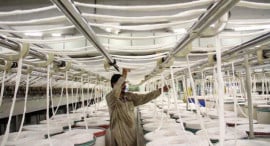
KARACHI:
Many investors may not fully realise it yet, but some of their favourite companies are going to suffer a cut in profitability soon.
More painful is the fact that the expected drop in their profitability will have little to do with their performance per se. Bottom lines of many companies will shrink this year mainly because of the imposition of the alternative corporate tax, which was introduced at the start of the current fiscal year.
Until the end of 2013-14, companies paid either the normal corporate tax or the minimum turnover tax – whichever was higher.

But with the imposition of the alternative corporate tax in the current fiscal year, companies will have to pay the highest of the three taxes.
The normal corporate tax is currently 33% of the pre-tax profit while the minimum turnover tax is calculated at 1% of gross revenues. In contrast, the alternative corporate tax will be computed at 17% of the ‘corporate accounting income,’ which excludes non-taxable heads, such as dividend income and capital gains on the sale of securities.
Speaking to The Express Tribune, Karachi Tax Bar Association’s former secretary general Zeeshan Merchant said the implementation of the alternative corporate tax is expected to result in unusually higher taxes for companies this year.

“The alternative corporate tax will hurt companies’ cash flows and create liquidity problems. This will increase bank borrowings, generate higher interest expenses, and eventually leave them with little cash to give out as dividends,” he said.
According to Saad Khan, assistant vice president at Arif Habib Limited, almost 42% of the market capitalisation of the Karachi Stock Exchange-100 Index, or 68 constituent companies of the benchmark index, will fall under the alternative corporate tax regime.
It is because banking, insurance and companies that are involved in production and exploration of petroleum or extraction of mineral deposits are exempt from the alternative corporate tax regime.
Khan said higher tax payable will reduce companies’ cash flows, thus delaying their planned capital expenditures and handing out of cash dividends.

“We estimate that cash outflows on account of the alternative corporate tax can increase nearly 1.5 times,” he added.
As an example, Khan cited Kohat Cement Company, which paid Rs418 million in income tax during 2013-14. But it would be liable to pay roughly Rs747 million in taxes under the alternative corporate tax regime, Khan said, highlighting that companies’ profitability will erode under the alternative corporate tax regime.
Published in The Express Tribune, September 25th, 2014.
Like Business on Facebook, follow @TribuneBiz on Twitter to stay informed and join in the conversation.






















































COMMENTS
Comments are moderated and generally will be posted if they are on-topic and not abusive.
For more information, please see our Comments FAQ